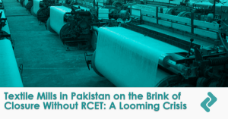
Understanding the Impact of RCET Withdrawal on Textile Mills in Pakistan and the Economy
By Syeda Rida Shammas
Understanding the Impact of RCET Withdrawal on Textile Mills in Pakistan and the Economy
Textile mills in Pakistan are facing an uncertain future as the Regionally Competitive Energy Tariff (RCET) faces discontinuation. This move, which has sparked concerns among industry stakeholders, has the potential to significantly impact the competitiveness and sustainability of textile mills in the country. In this blog post, we will explore the role of RCET, analyze the previous performance of Pakistan's textile industry, delve into the implications of RCET discontinuation, and shed light on the pressing questions surrounding this decision.
The Role of RCET in Boosting Textile Mills in Pakistan
The application of RCET played a pivotal role in catapulting Pakistan's textile industry to new heights. Under RCET, textile exports experienced a remarkable surge of 55%, rising from $12.5 billion to $19.5 billion in the financial year 2021-22. This incentive program enhanced the industry's competitiveness on a global scale, allowing Pakistani textile mills to compete effectively with countries in the region.
Understanding RCET: What is it?
RCET, the Regionally Competitive Energy Tariff, is an incentive program introduced to bolster the competitiveness of Pakistan's textile industry. It aimed to provide competitive energy tariffs to textile mills, enabling them to reduce production costs and enhance their ability to compete in international markets. By ensuring a level playing field, RCET facilitated the growth and expansion of textile mills in Pakistan.
Make Textile Raw Material Sourcing Fast and Efficient with Zaraye
The Implications of RCET Discontinuation
The withdrawal of RCET poses significant challenges for textile mills in Pakistan. The abrupt discontinuation of this crucial incentive program jeopardizes the industry's global competitiveness, hindering its ability to sustain export growth and generate foreign exchange. Experts predict a potential decline in textile exports, leading to a substantial shortfall in revenue. This looming crisis threatens the large-scale manufacturing sector and extends its impact to small and medium enterprises and the cottage industry, which relies on textile mills for their survival.
Previous Analysis Reveals Promising Trends
Pakistan's textile industry witnessed a surge in exports, reaching $19.5 billion in the financial year 2021-22, thanks to competitive energy tariffs under RCET. The industry was on track to achieve $22-24 billion in textile exports in the current fiscal year. However, the withdrawal of RCET, combined with foreign exchange constraints, difficulties in energy supply, and a liquidity crisis resulting from currency devaluation, has halted this upward momentum. This year alone, Pakistan is experiencing a significant shortfall of over $3.5 billion in textile exports compared to the previous year.
Addressing Concerns and Pressing Questions
The sudden discontinuation of RCET has raised critical questions about its impact on textile mills in Pakistan. The potential consequences include job losses, a decline in export revenue, and a further deterioration in the balance of payments. The government's decision to withdraw RCET at a time when foreign exchange is needed has caused confusion and concern. Additionally, the closure of textile mills will not only affect the large-scale manufacturing sector but also have a cascading effect on small and medium enterprises and the cottage industry that rely on these mills.
Navigating the Crisis and Seeking Solutions
To mitigate the negative impact of RCET discontinuation, the government and industry stakeholders must come together to find alternative solutions. Exploring options such as revisiting energy tariffs, incentivizing investments, and supporting technological advancements can help maintain the competitiveness of Pakistan's textile mills. It is crucial to address the concerns raised by industry leaders and develop a comprehensive strategy to support the growth and sustainability of the textile industry.
The discontinuation of RCET poses significant challenges for textile mills in Pakistan, threatening their competitiveness, export growth, and overall economic stability. The surge in textile exports achieved under RCET demonstrates its effectiveness in attracting investments and bolstering the industry's global standing. As the industry faces an uphill battle, policymakers and stakeholders must recognize the importance of supporting the textile sector and finding viable solutions to navigate this looming crisis. By addressing concerns and working towards sustainable alternatives, Pakistan can strive to maintain its position as a prominent player in the global textile market.





